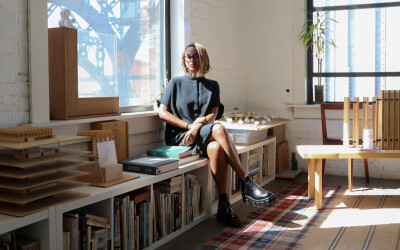Meet Barrett Ward
I didn’t set out to start a fashion company—my team would resoundingly agree that I’m the least fashionable person in the office. This journey is one that found me.
Until I was 30, I was working in the corporate sales world, and I ended up on a trip to Peru that caused a fundamental shift in my perspective on life and work. I was struck by the feeling that I was missing the entire point of life, and I began to grapple with the chasm between the life I lived and the poverty I witnessed. This started a journey of self-discovery that lead me to the nonprofit world for the next 5 years. Before I knew it, I got married, my wife got a job in Ethiopia, and we moved to Africa. While we were there, we met brilliant women coming out of the commercial sex industry who told us they simply needed a job opportunity and asked if we could help. I met one woman who had gone into prostitution to save her sister from breast cancer, and I felt compelled to find a sustainable solution for these women who were actually making heroic sacrifices, ones I couldn’t imagine having to make, for those whom they love.
In Addis Ababa, scarf-making is a big industry, but it was largely male-dominated. So we trained women how to make scarves and sold them during the holidays. In just 2 months we sold over 4,000 scarves. We were blown away, but we knew we were onto something.
There were two convictions from the early days of ABLE that still guide our business: 1. Creating economic opportunity for women is the key to ending generational poverty around the world, and 2. In order to continually and increasingly empower women, we have to make products people want to buy regardless of our mission. It’s the only way our business model can be sustainable. From there, ABLE has evolved from a line of handwoven scarves to a lifestyle fashion brand with a full product offering of apparel, shoes, jewelry, scarves, and leather goods.
I believe women will heal the world, and at our core is a deep commitment to the protection and empowerment of women in the workplace. We’re truly a women-run company, with women representing 64 of our 67 employees in Nashville (ABLE Headquarters). Along the way, we’ve been able to partner with women around the world, including right here in Nashville, who want to be entrepreneurs and open their own businesses or who have overcome difficult circumstances and need sustainable work that pays a livable wage in order to support their families.
Above all, our driving motivation is to make a real, measurable difference in the communities we claim to impact. A few years ago we wanted to better understand the way our business was impacting people and communities around the world. We explored various audits but quickly realized that there was a gap in the market for a boots-on-the-ground audit with a particular focus on women in the workplace. So we spent three years developing our own evaluation system—called ACCOUNTABLE—which evaluates our manufacturing partners on safety, equality, and wages in order to give us better insight into the impact of our supply chain on the women making our products.
This fall, with the release of our ACCOUNTABLE reports, we began publishing our lowest wages. Fashion is the largest industrial employer of women worldwide, yet only an estimated 2% of fashion workers are paid a livable wage. We want to change that, but we know the only way companies will change their practices is if their customers demand it. We published our lowest wages in order to give consumers a clear choice to protect the people making their products, and we want other companies to do the same.
By doing this, we hope to break the seal of the secret that is keeping women oppressed in fashion manufacturing, putting us on the path to long-term sustainable change once and for all.
Barrett Ward is the CEO of ABLE, a lifestyle fashion company whose mission is to end generational poverty by providing economic opportunity for women. Their product line of jewelry, apparel, shoes, and leather goods are made domestically in Nashville (jewelry) and in partnership with manufacturers in Ethiopia, Mexico, Peru, and Brazil. In August 2018 they became the first company to publish their lowest wages, which they hope will become the industry standard, expose the abuses in the global fashion industry and move it towards long-term, sustainable change.
Learn more about ABLE




